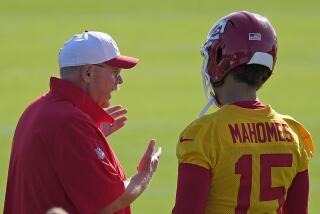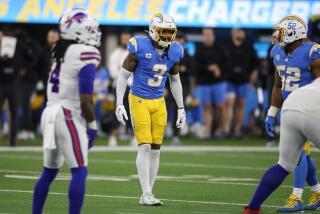PRO FOOTBALL
CHARLOTTE, N.C. — Scan the players’ parking lot at Bank of America Stadium and you catch a glimpse of the luxury an NFL career can bring. Late-model Mercedes, Lexuses, foreign sports cars and souped-up SUVs with fancy rims take up nearly every space.
The Carolina Panthers are no different from the rest of the NFL. After years of skyrocketing salaries tied to booming league revenues, players have cashed in on being part of a hugely popular sport.
Yet with labor rhetoric rising and fears of a lengthy lockout in 2011, there’s a much different message being sent to players by the union: The money spigot could soon be turned off.
“I think it’s very important that we show some restraint on spending a lot of money and being frivolous,” said receiver Muhsin Muhammad, Carolina’s union representative. “I think young players need to worry about necessities, because after two years nothing is guaranteed.”
With the owners deciding to trigger an early end to the collective bargaining agreement after the 2010 season, there are ominous predictions of a lengthy work stoppage that could wipe out the 2011 season -- leaving players used to living in excess without any income.
“From our standpoint right now, you not only prepare for the worst, that seems like the direction it’s headed,” Tennessee defensive end Kyle Vanden Bosch said. “If players aren’t prepared, if guys are in bad financial situations, it hurts our leverage as players.”
The situation has led to a burst of activity by the NFL Players Assn. The union sent out a letter to players this summer talking about a “25-25 program.” It suggests saving at least 25% of take-home pay this year and next to build a nest egg if the checks -- and benefits -- disappear.
Players say the union also is considering putting some revenue from dues and licensing agreements in an escrow account that would be paid to players if there are no games.
“They’re going to probably want guys to increase their dues to the union in case there is a [lockout],” said defensive end Dewayne White, Detroit’s NFLPA rep. “We’re working on that plan and trying to figure out how and how much guys would get paid -- maybe $50,000 for the year.”
For the millions who have lost jobs in the past two years, it may be difficult to have sympathy for players -- or the owners who reap billions of dollars in television revenue.
The NFL’s first salary cap, implemented in 1994, was $34.6 million per team. The cap was at $85.5 million before the CBA was extended in 2006. That agreement calls for players to receive 60% of league revenues. That caused a massive jump in the cap to $128 million this season, a $12 million spike from 2008.
Owners, concerned about those rising salaries, voted to reopen negotiations on an agreement that was originally scheduled to expire in 2013.
“Our focus is on bargaining and negotiations and getting a deal,” said Jeff Pash, the owners’ lead negotiator. “Anyone who says our goal is to lock the players out or shut down our business, that is a view that is really divorced from reality.”
The players aren’t buying it.
“Everybody’s on notice,” said Washington long-snapper Ethan Albright, the Redskins’ interim union rep. “From the actions that [NFLPA chief DeMaurice] Smith is watching, the owners are taking all the steps to set up for a lockout in 2011.”
Hence the urgency to save -- new ground for many players. With the rookie minimum salary jumping to $310,000 and with signing bonuses for top picks growing yearly, most players have entered a tax bracket where a household budget isn’t necessary.
“I have a house back in Louisiana that I bought, and I’m renting out here, so I have two houses,” said San Diego fullback Jacob Hester, whose wife is expecting their first child this month. “So if it gets to that time, you might have to sell your house back there. You won’t be making the money it takes to have that luxury. It could be some serious times.”
Many veterans are concerned younger players like Hester may be more exposed to financial hardship, especially if they splurged on fancy cars and big homes with their signing bonuses.
“Some of these younger guys might feel that way, ‘Aw, it’s two years away,’ ” said Dallas linebacker DeMarcus Ware. “But guys like me, I make sure I harp on them and let them know even though it’s two years away, you only get paid 16 weeks out of the year and you need to think about it.”
Agents have been urging players to save, too. Darin Morgan said he told his clients to work with financial advisors.
“As long as you’re spending money on things you need, like food and gas, your apartment, wherever you’re staying, you’re fine,” Titans rookie running back Javon Ringer said. “It’s the extra things that everybody’s talking about, like buying a whole bunch of big old necklaces and big old bracelets and huge fancy cars and putting rims on them.”
Some union representatives are focusing on another issue: A lockout would mean players would also lose benefits, including health insurance. That could force players not getting paid to shell out big bucks to cover their families.
“The younger guys probably don’t realize that,” New York Giants kicker Lawrence Tynes. “I’m definitely concerned about it.”
Some current rookies weren’t born in 1987, when NFL players last went on strike -- a stoppage that lasted only a month.
“We should prepare,” said Muhammad, the Panthers receiver. “It could be a year, it could be six months, it could be two seasons. I think all indications say that there will be something in 2011 -- and more than likely it won’t be good.”
--
Barry Wilner in New York; Teresa M. Walker in Nashville, Tenn.; Larry Lage in Allen Park, Mich.; Jaime Aron in Irving, Texas; Tom Canavan in East Rutherford, N.J.; Bernie Wilson in San Diego and Joseph White in Ashburn, Va., contributed to this story.
More to Read
Go beyond the scoreboard
Get the latest on L.A.'s teams in the daily Sports Report newsletter.
You may occasionally receive promotional content from the Los Angeles Times.










